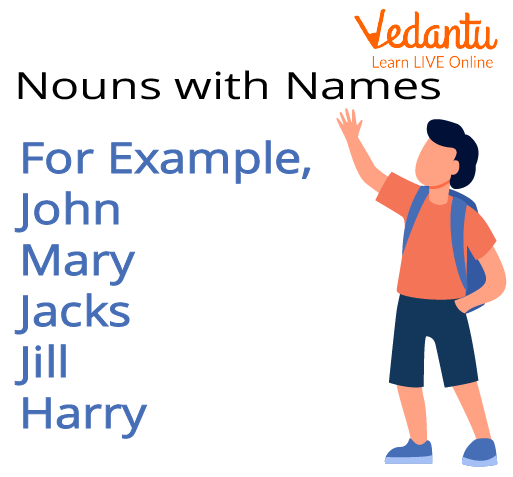Essential Noun Concepts for Class 2 English Grammar with Free PDF (2025-26)
The noun is the first thing children learn in English grammar as it is the building block of any language. The noun is a vital chapter to understand as it performs various functions in a sentence; it is necessary to learn what is a noun for Class 2 students. In simple words, a noun is a name of a place, person, animal, or thing. The noun is an important part of speech; they act as a direct and indirect object of a verb.
Sometimes students can get a little confused while learning about nouns, as they play various roles in a sentence. Nouns even act as a complement and an object to a proposition. However, the chapter noun for Class 2 and appropriate learning materials will help students learn about the structure and Importance of nouns.
English Grammar for Class 2 Noun - Naming Words Download Free PDF
In this article, we'll discuss nouns the naming words. Nouns are a fundamental component of all languages and are important for effective communication. Let’s begin the journey on this amazing topic.

Introduction to Grammar.
Noun
A noun is a term that designates a specific entity, such as a person, place, thing, event, or quality.
Nouns are the fundamental units of sentences and can be used to form more detailed words.
There are three genders: neuter, female, and male.
Articles, suffixes, and prefixes can all be used to change nouns (un-, de-, anti-).
Noun - The Naming Words | Examples |
Nouns with names | Ram and Seetha |
Nouns with Birds and Animals | Parrot and Kangaroo |
Nouns with names of objects | Electronics |
Nouns with names of Places | Home |
Nouns with names of fruits and flowers | Banana and Sunflower |
Nouns with Names
Personal names are typically nouns because they represent unique individuals.
Personal names are also regarded as special because they signify an individual's identity and place in the world.
They provide information about who you are and where you come from.
For Example,
John
Mary
Jacks
Jill
Harry

Noun with Names
Nouns with Birds and Animals:
we say, "I saw an animal," as opposed to actually referring to a specific animal.
Because all birds of a species have characteristics like feathers and a strong beak, they are frequently categorized as belonging to the same species.
As a result of that it is a particular name, "animals" is a noun.
For Example,
Butterflies
Nightingale
Owls
Dogs
Tiger

Noun with Birds and Animals
Nouns with Names of Objects:
An object is anything that has physical form, such as a chair or a table.
It can also refer to any possession that you have, be it something tangible like jewellery or an appliance, or something less tangible like happiness or love.
The object usually follows the verb and is a noun group or pronoun.
For instance, the phrase "I've promised the children new bicycles" has two objects: the direct object, "new bicycles," and the indirect object, "the children."
synonyms and words that are similar. various word, phrase, and sentence types.
For example,
Chair
Table
Furniture
Computer
Laptop

Noun with Names of Objects
Nouns with Names of Places:
A place is a noun that designates a space or a place,
A specific location, region, or portion of a surface, especially one that is occupied by someone or something.
It can be either inanimate (like a room, house, or store) or animated (like a city, state or country).
For Example,
Tripura
Hong Kong
Classroom
Airport
Station

Noun with Names of Places
Noun with Items
An item is a piece of news, a unit, an article, or slang for a piece of gossip. A carton of milk is an example of an object.
An item consists of two people who are a pair.
A sentence with a specific legal or other significance;
A distinct detail in an account.
These include a table, book, pizza, pen, flower, ring, and many more.
Categories of Nouns
There are different categories of nouns, including proper, common, abstract, and concrete nouns.
A noun is a term that identifies a specific person, location, animal, item, or concept.
1. Common Noun:
Most nouns are common nouns. Common nouns, such as chair or dog, are used to refer to persons, places, and objects in general. A common noun is any noun that is not a name.
Example:
teacher, vehicle, music, risk, and receipt
Do you recognise my dog?
Your workstation is where the books are.
The effort to find happiness.
2. Proper Noun:
Proper nouns are the names of individuals, places, or organisations. A proper noun is your name. A proper noun is "London." A proper noun is "United Nations."
Proper nouns must always begin in capital letters.
Jane, Thailand, Sunday, James Bond, Albert Einstein, Superman, Game of Thrones, and Shakespeare are other examples.
Example:
I'd like to introduce Mary to you.
Rome serves as Italy's capital.
He oversees the British Broadcasting Corporation as its chairman.
In November, I was born.
3. Concrete Noun:
Concrete nouns are tangible objects you can touch.
Examples include a man, a head of rice, a car, furniture, and a cellphone.
In the universe, how many stars are there?
I don’t have a cell phone.
Fill the drain with water.
4. Abstract Noun:
Concrete Nouns Contrary to concrete nouns are abstract nouns. They are items you are not allowed to touch. Ideas, concepts, and sentiments are abstract nouns.
Examples:
joy, bravery, peril, and truth
He is quite powerful.
It remains a mystery as to who killed President Kennedy.
Telling the truth requires bravery sometimes.
Their existence was miserable.
Summary
We have now finished our discussion of the significance of nouns and names in language. Knowing the rules will make it easier for you to use good grammar. The key element in a sentence is the nouns. Nouns are used to describe the individuals, objects, ideas, and other components of our environment. They act as the language's building blocks. The most significant of the many speech elements may be nouns.
Practice Questions
1. The terms used for naming are
People
Place
Animals
Things
All of these
2. Choose the place names.
Home
Computer
Lotus
Daisy
Father
3. Choose the animals' names.
Father
Mother
Grandfather
Elephant
Hospital
4. Pick out the objects' names.
Table
Apple
Strawberry
Hospital
Home
5. Pick the name word that goes with the sentence "I lie on a bench".
I
Lie
On
A
Bench
Answers:
1. The correct answer is option D, All of these.
The terms used for naming are People, Place, Animals, and Things.
2. The correct answer is option A, Home
“Home” is a place.
3. The correct answer is option D, Elephant
“Elephant” is an animal.
4. The correct answer is option A, Table
“Table” is an object.
5. The correct answer is option E, Bench.
“Bench” is the name word in the sentence "I lie on a bench".
Importance of Knowing Noun Definition for Class 2
There are two types of nouns, common and proper, and they help differentiate between objects, places, and things. If the definition of nouns is clear to the students, it helps them understand more complex topics easily in higher classes. Here are some importance of learning noun for Class 2 students:
Chapter naming words for Class 2 is important for students to understand as it helps to structure the sentences better.
Understanding noun definition for Class 2 improves English and helps students use nouns as the subject of a sentence that performs the action of the verb.
Learning naming words for Class 2 is one of the first things to understand to learn any new language.
If the concept of noun definition for Class 2 is clear, students can easily understand the connection between writing and grammar.
Daily practising nouns exercises for Class 2 can help students understand the functions of nouns and how they are used with verbs and prepositions in a single sentence.
Different Practice Materials in Noun Worksheet for Class 2
Here are some examples of different exercises that students can practise in the noun worksheet for Class 2 to do the revision and grasp the topic more clearly:
Unpuzzle the words to Form a Common Noun From It
Here are some common nouns in the jumbled form:
GLRI = ______
OYB = _______
OYT = _______
FTUIR = _______
ANM = _______
Which Word Represents What
Below are the few words that are either a name of a place, person, animal, or things. Identify and write the correct answer:
Boy, teacher, Father, Sister = ______
House, Shop, School, Park = _______
Cat, Cow, Rat, Horse, Dog = ______
Pen, Ball, Bat, Book = ______
Some Interesting Facts about Naming Words for Class 2
Here are some of the interesting facts about nouns that students should know:
The noun is the most overworked or overused among all eight parts of speech.
The English language contains more nouns than any other type of word.
One of the common yet unnoticed facts you will see after learning the definition of noun for Class 2 is that the noun is mostly used after the word 'some' or article a, an, the.
The common noun is the naming word for animals, places, people, and things.
Important Topics in the Chapter Noun
Here is an overview of the topics students will learn about nouns in CBSE class 2 English grammar:
What is a noun? How to identify different naming words.
Types of nouns.
Different noun worksheets for Class 2 to understand the usage of nouns in the sentences.
Characteristics and need for different types of nouns.
Download Free PDF for Noun Class 2
Learning nouns can be a little overwhelming in the beginning. Therefore, a free PDF for the chapter noun will help students learn different topics, including the definition of noun for Class 2.
Students can download the free pdf and can easily learn about the topic and what is a noun for Class 2, along with explanations and examples.
The free PDF contains information about the noun in a simple and easy-to-understand language.
It is easy to access the PDF or a quick revision from anywhere, and students can practise daily nouns exercises for Class 2 to clear their doubts.
The PDF content will help students understand noun usage concisely with multiple exercises.
The noun is the building block for understanding other complex topics like verbs, prepositions, etc., as the noun is the most commonly used part of speech. Therefore, experts at Vedantu have given a complete guide in a free downloadable PDF to easily learn about CBSE Class 2 English grammar topic Noun-Naming Words. It will help Grade 2 students simplify the process of understanding different types of nouns.
FAQs on Complete Guide to English Grammar Nouns for Class 2 – CBSE 2025-26
1. What can a Class 2 student learn in the chapter Noun-Naming Words?
Students can learn about different naming words, direct and indirect nouns, common and proper nouns etc., in the Chapter noun in Class 2.
2. What are some examples of nouns for Class 2 students?
Some examples of nouns for Class 2 students are rat, bat, girl, school, etc.
3. Why is it important for children to learn different types of nouns?
Learning different types of nouns is vital as they help recognise different naming words. Children can easily identify common and proper nouns, and it also improves their English speaking skills.















